#apologies I have Had A Few
Note
hi what r your thoughts on time travel sam & dean?? like older sam hanging out w younger dean and vice versa for like... magic plot reasons etc idk. i just ask because you do SUCH a great job at writing both adult and teenage them, so i wonder what your thoughts are on how they would approach their teenaged-brother!
I'm new to participating in fandom in a way where I am ~known~ and it's so great to be asked stuff like this apropos of nothing. it feels like a slumber party. we are braiding each other's hair.
(also, thank you, when I first started writing spn fic I told myself I wouldn't write weecest but I love writing teens so much, they're so complicated and sloppy, so I'm glad it comes out ok)
I've never really thought about time travel sam-dean before, but I will now!
older sam with younger dean would be veeeery interesting because I feel like.. when Sam was a kid, he oscillated between thinking Dean was big-brother annoying and didn't understand him at all, and thinking he was SO grown-up and larger than life, in the way that when you're 12, kids who are 16 seem like they're practically in college, you know?
so I think seeing teen-dean as an adult, sam might be.. struck by how.. small he was? not physically (and also yes physically) but that he was actually pretty insecure, and pretty lost, in a way sam didn't see when he was a kid. and he might think that maybe he could've looked out for dean more if he'd noticed how dean wasn't always the brave face that he put on, but you don't always think of that as the little sibling, you think they're always fine. it would be a very fun thing to write.
old dean with young sam would be absolutely KNEECAPPED by seeing sam young again because dean, as we all know, still sees adult-Sam as a kid. so seeing him actually as a kid would be "oh! oh, you WERE small. and now you are.. so.. big." he'd be starry eyed and nostalgic like the fourth of july scene. moreso than sam, he'd feel guilty seeing this unblemished kid and knowing what he'd have to go through in the future (what he wouldn't be able to save him from going through!) and I think he'd be very caught off guard by how capable sam was as a kid, not the baby he saw him as. but also: how weird and sad and trapped he was. would probably give him a new perspective on stanford.
I can't speak to this from a wincest angle without my lawyer present
#apologies I have Had A Few#you'll get the worst longest funniest answers from me after 8 PM PST weds to sat#ronanswers#🏕
35 notes
·
View notes
Text
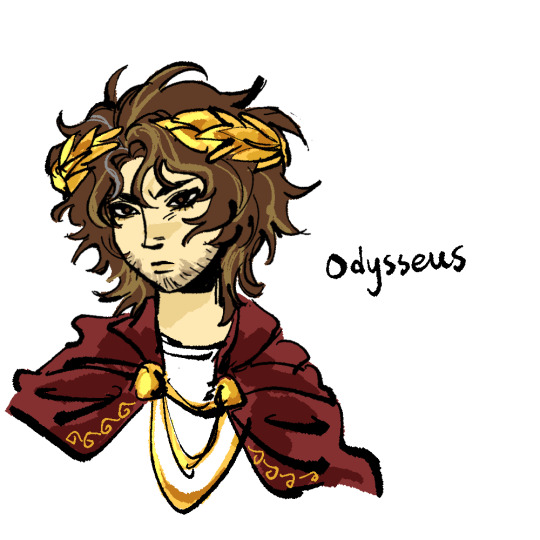
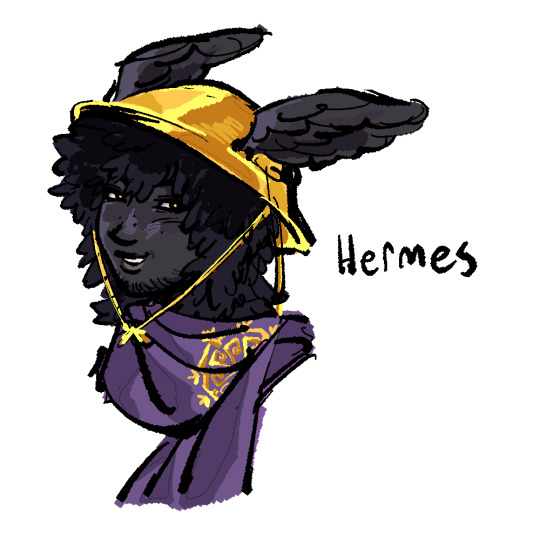
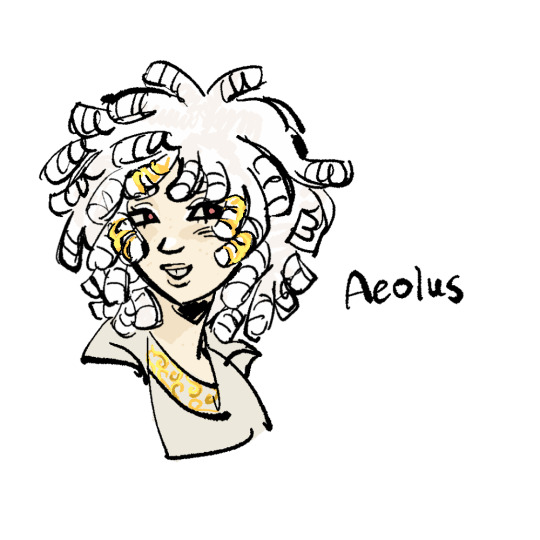
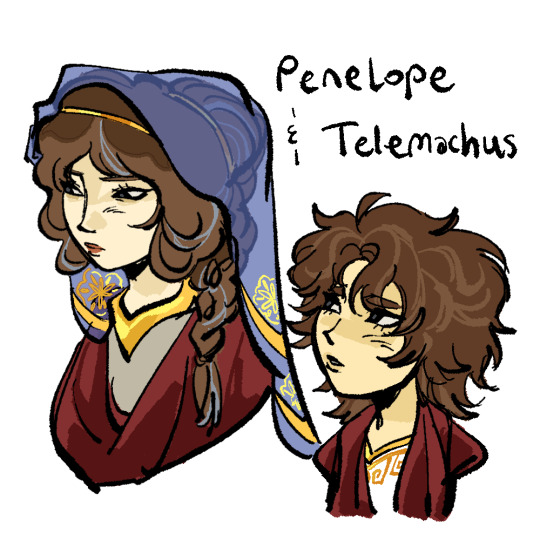
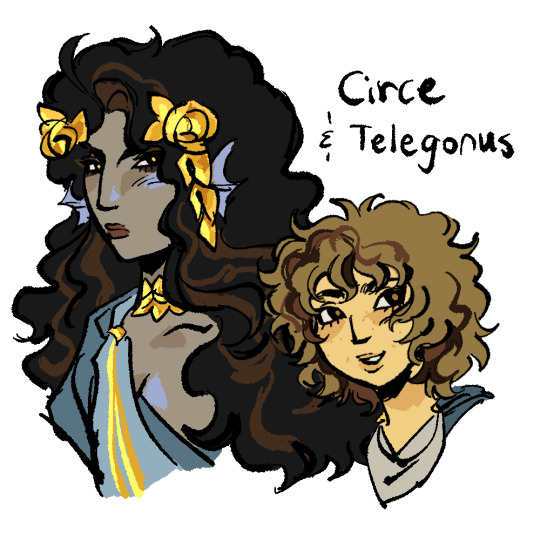
FINEEE i'll draw your stupid greek mythology people
#epic the musical#the odyssey#odysseus#penelope#telemachus#circe#telegonus#hermes#aeolus#ok... listen....#i finished listened to all the current sagas in one go and kinda went crazy and had to draw a few characters#the designs aren't specifically based on their singers#i just wanted to have a crack at designing them for myself#also I KNOW telegonus isn't in the musical (yet?) but i wanted to draw him w circe#like i drew telemachus with penelope#was supposed to draw athena along w this batch but her design refused to look good so i gave up#apologies#listen to just a man#epic the troy saga#epic the cyclops saga#epic the ocean saga#epic the circe saga#greek mythology
1K notes
·
View notes
Text
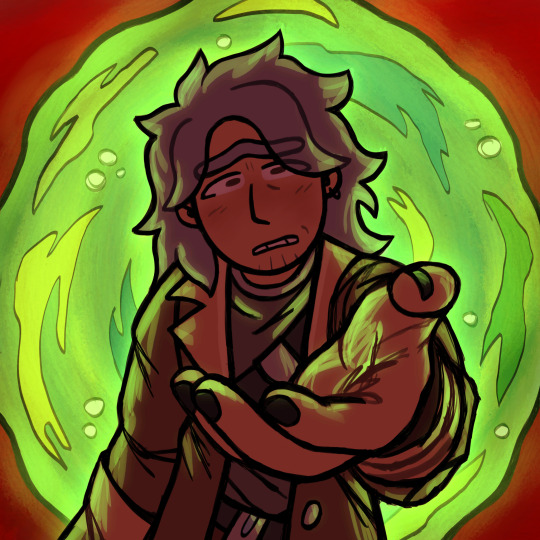
the final phrase of my last sentence / hangs in the air, sounding stupider and stupider
#THE LINK IS MY BIRDRICK PLAYLIST. LISTEN TO IT PLEASEEEEE#rick and morty#birdrick#rick sanchez#rick c137#oh my GOD i struggled w the colours on this one. im SOOOO bad at colours man 😭😭😭😭😭 bane of my life#idgaf if this isnt how it happened in the actual scene. imagery over truth#if it bothers u ummm imagine its a dream or smth.#had to take dreadful reference pics of myslef for this. worth it#i might change the playlist art at some point to smth more fitting but idgaf i just want to show ppl now#and ive wanted to draw this for a whileee now lol#BUT YEAHHHHH. LISTEN TO MY PLAYLIST BOY#artsbotz#oh my god ok im not makinga ny more tiny edits. POST#COMPLETELY FORGOT TO TALK ABT THE PLAYLIST LOL#urmm hopefully its kinda clear which pov each song is. except a few kinda mixed ones#it goesssss all the way from them meeting up until like. s5 ending kinda#apologies again for all the csh. youll have to cope im afraid#its vital listening. listen to twin fantasy btw. btw
437 notes
·
View notes
Text
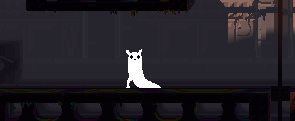
the mold
#rain world#rw modding#rw slugpup#rwpups+#gif#i apologize for taking this long to update pups+ for the new version#im also going to be releasing an update for the mod along side porting to the new version#i havent had much freetime in the last few days to work on it#that combined with me having to fix the foodbar bug to even be able to work on the mod didn't help#but now i should be able to get it out soon#thank you for your patience everyone!
209 notes
·
View notes
Text
ayoo guess who finally sat down and caught up with cultivate B)
is me. so you know what that means.
spoiler warning for cultivate ch 30-37
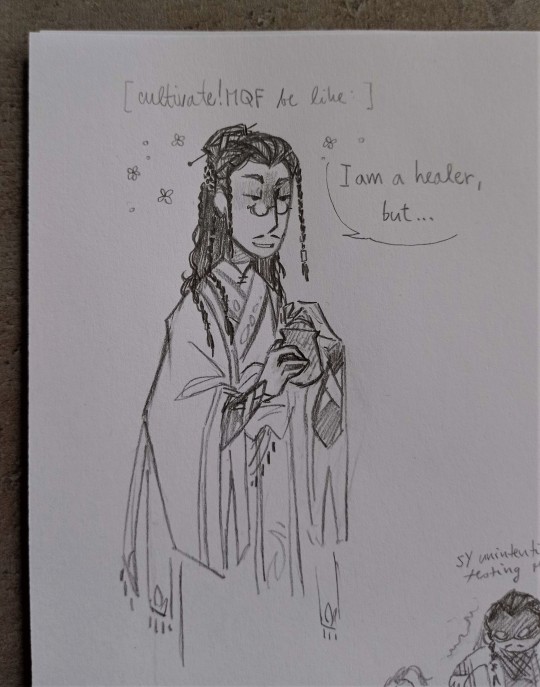
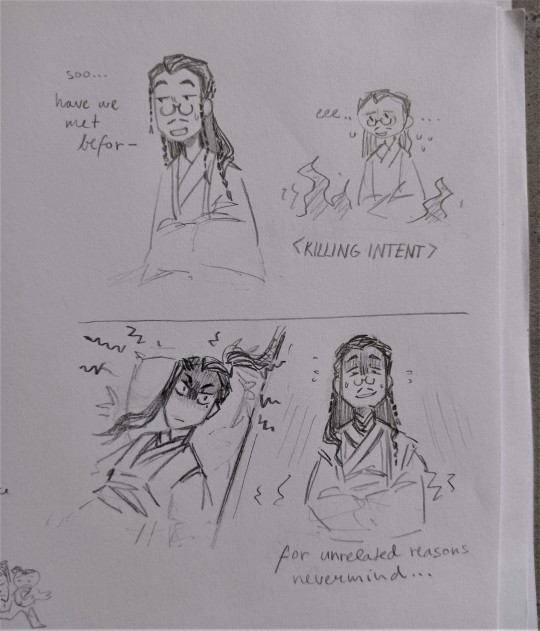
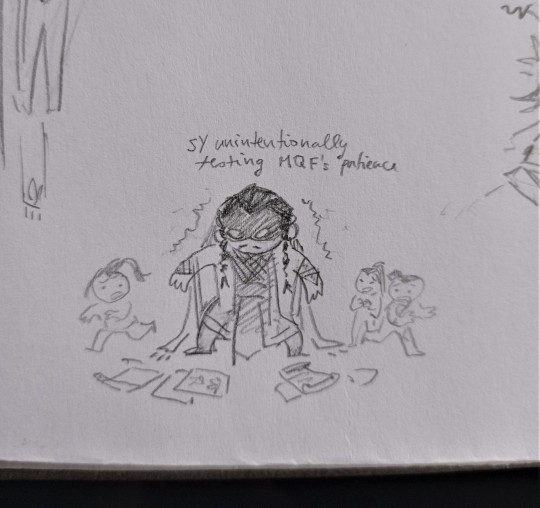
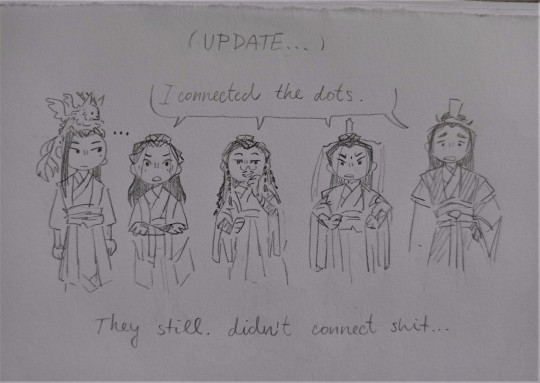
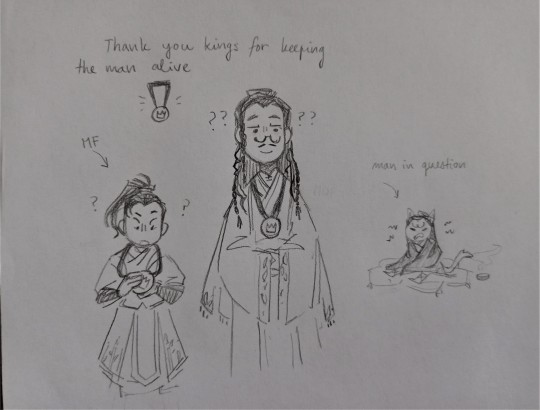
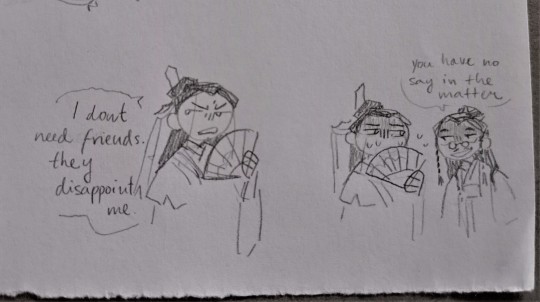
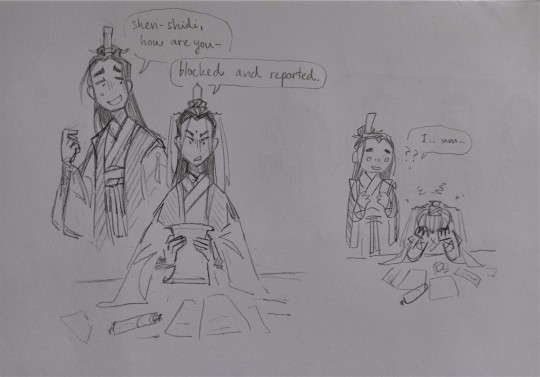
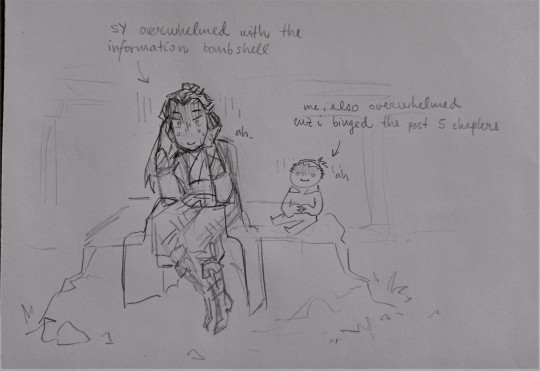
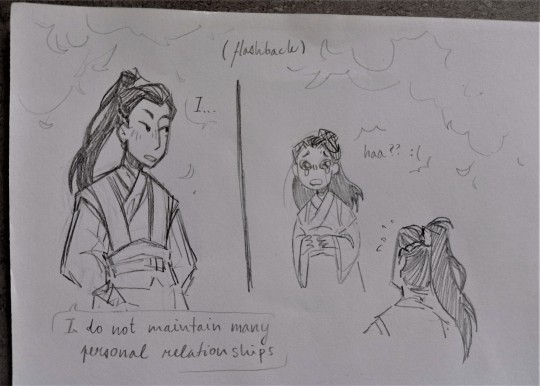
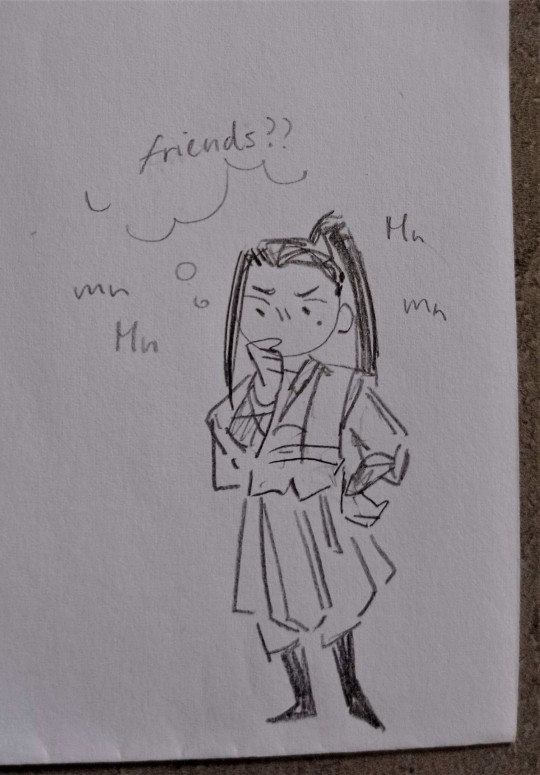
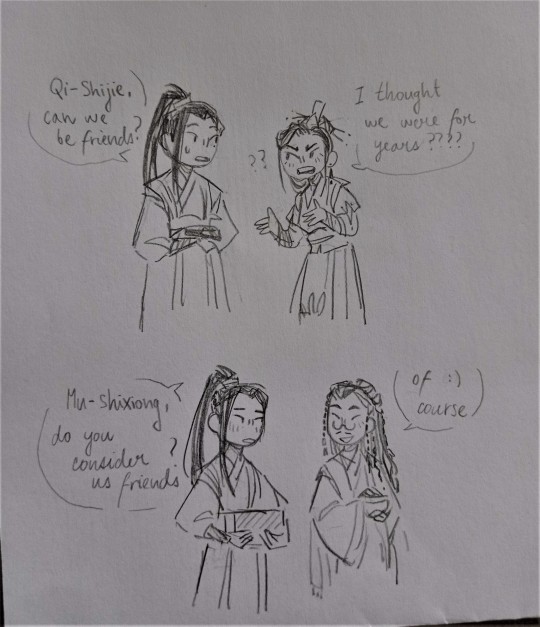
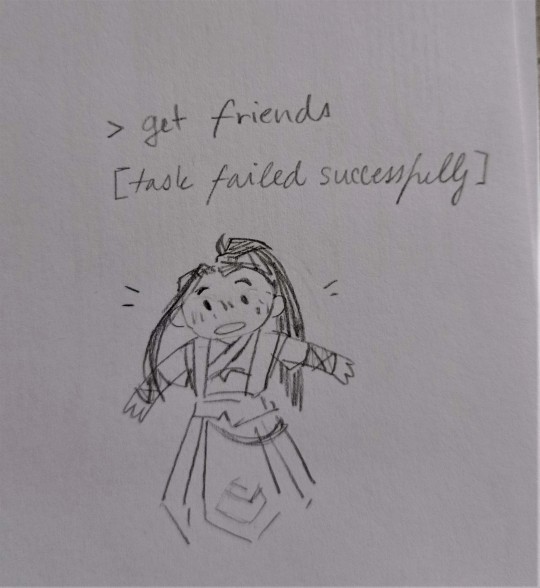
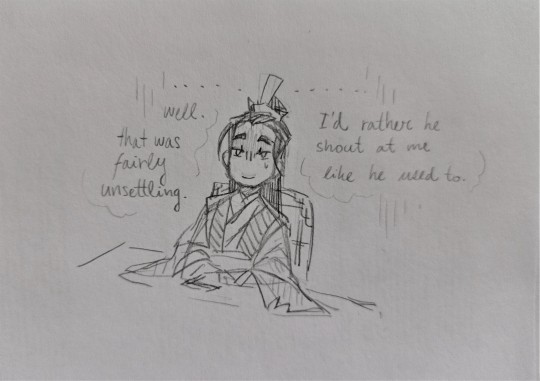
there was actually.... more things i wanted to draw but I already did so many I had to physically restrain myself hfsjkkdh anyway yes can you tell i love this fic very much
yet once again. cultivate by the wonderful @neonghostcat
#liushen#cultivate#cultivate: slow life on a monster infested mountain#mu qingfang#tagging him as well since theres lot of focus on him lol#and shen jiu as well u have to excuse me I love them they're meow meows#there was gonna be more sj content also but he ended up being cut in the end#wait- hdfdfhkj probably shouldnt talk about cutting something and SJ in the same sentence lmao jhfksdhfk ok bad joke sorry#anyway aaaaaaaaaaaaaaaaaaaaaaaaaaaaaaaaaaaaaaaaaaaa absolutely deceased with all that has been revealed and covered in the past few chapter#actually dead wonderful powerful talented incredible showstopping never seen before#my most favourite part of cultive is its mysteries without a shadow of a doubt they're so intriguing and the reveal is ALWAYS sooo satisfyi#so the chain reaction of so many answers of the big ones tm? chefs kiss MWA#speaking of mysteries i never mentioned it before because I didn't know how to incorporate it without it being awkward but#for the longest time one particular piece of info has been rotting in my brain#and it was the off-hand comment on of the aqueduct by LQG#it is SO SILLY but THATS the one that has been just spinning in my brain FROM THEN ON ALL THE TIME it is indeed not the actually much coole#checkovs guns that have been setup nooo it was THIS hjkjsdfhksd I HAD TO KNOW where that was going AND NOW I KNOW I CAN REST EASY jsdhfkd#so yeah absolutely wonderful chapters indeed beautiful powerful#also some of you may noticed that time and time again I keep switching up the seniority between bai zhan and qian cao#and i have to formally apologize for that it is in fact not out of lack of attention to the text I'm just shdjkas#if im not mistaken qian caos position is not set in stone in canon so its free for grabs to put it in any of the free spots on the list#so i should respect neonghostcats (beloved i am so sorry) list in this case but i physically couldn't bring myself to write mqf as shidi#HSAJHS im sorry i am so biased and from doctors family i cannot put him in my head in peak seniority so low I'm sry i am legally not allowe#so lets just pretend i wrote it correctly ok sadhkas eyes closed xD#OOF th etags got long this time but im just SOOOO EXCITED WITH THIS FIC AND GOT FEELINGS OK BYE#anyway neonghostcat godspeed recovery buddy!!#also i hope using neonghostcat isnt like....calling u by your full name hdkfh but no idea to which parts i should shorten it either so hah
447 notes
·
View notes
Text
analysing vance hopper because he lives in my head 24/7 !
tw for like. literally everything the black phone covers!!!!!!
also there's some special effects gore rather far down in the post idk just i feel like i should warn you just in case
okay so before anyones like "but bee!!!! he only had 6 minutes of screen time in a 102 minute long movie!!!!! he was only on screen for 5.8% of the movie!!!!!" and to that i say i Know it was a real tragedy so a lot of this will be built on personal interpretation and subtext and stuff said behind the scenes and whatnot
so firstly i wanna rot about what his childhood/upbringing might've been like..... i havent quite decided on something definitive but i think we can take one look at his character and realise that is glaringly obvious he had a bad childhood, in one interview the actor that plays him (brady hepner) says "the background i had set up for vance is that the reason he was the way he was is his home life was fairly difficult, you know maybe his dad was either not there for him or he wasn't supportive, maybe he was fairly abusive, and so that creates a hair trigger sense of rage in vance" hair trigger meaning his patience is literally as thin as a strand of hair it does Not take a lot for him to snap
there more to it after that which i'll get into soon but yea thats the gist of it it's clear he had absent/neglectful/abusive parents and that would certainly contribute to why he's so angry all the time, maybe acting so explosive was the only way to get his parents' attention, either good or bad, so he just internalised that. obviously rage and anger issues like vance's lead to violence (not in all cases but in his case it does) and i think a neglectful and abusive upbringing would obviously expose him to more violence than a normal childhood would, therefore normalising it and desensitising him to it, whether he's seeing it play out in his own home and/or on television or something like that (because i doubt his parents would be the kind to monitor what content he's viewing)
i feel like he has little control over his life and that only adds to his anger, which in his case leads to a fight when his buttons are pushed too many times. i think he probably takes great pride in being the toughest in town and whatnot and winning fights and being perceived as strong and scary is good to him and helps him regain control/power, something he doesnt have at home. the rest of the quote from the interview i mentioned earlier states "this pinball machine could have been the only thing that he has in his heart that's like, good, like 'holy cow i did this, i set the score,' so when someone comes along and messes it up for him, it takes away the only thing that he has. i think that that's when he switches to a 'now you're gonna pay for that'"
similar to what i said about fighting, the pinball machine and his high score is something he has control over and its an important part of his reputation/image like. hes literally pinball vance ! and the whole thing about that high score being the "only thing he has in his heart that's good" implies that hes. well. pretty shit at everything else, which is pretty much canon if you remember that gwen said vance was held back twice in school. makes me think that while he's not the brightest in school he's certainly street smart
moving onto ermmmmm him getting kidnapped era because im sure youre wondering "well bee if he's so street smart then why did he get kidnapped" so may i raise two theories (this is. literally all i got and its not even concrete, me and my friend gray (@staggersz) tried to figure out how this could even happen and this is the most plausible thing we've got. so shoutout to him real quick he has had to deal with me being unnormal about vance for like a year and a half thanks king couldnt have done all this without my rotting buddy)
so either he got taken by surprise (most likely option) or vance's trust was gained first via getting given quarters at the pinball machine and small talk and shit like that but this is unlikely because i feel like it'd take a loooooong time for someone like vance to trust a some random stranger adult man when he clearly has issues with trusting and respecting people older than him and people with authority (e.g. cops, his parents, or school officials) so yea being taken by surprise would probably be the most realistic option, i always see people on tiktok being like "how did the grabber kidnap vance hes so strong!!!!" dude its a 15 year old boy against like. a 45 year old man who's already claimed two lives its really not gonna be a fair fight here
before i get into the next part i wanna quickly address a theory i absolutely Hate and it is so easily disproven and that is the theory that vance is the grabber's son or is related to him in some other way and i see it Far too often on tiktok and i HATE it. from what ive seen this all stems from his dream sequence where he kicks open the fence to albert's house and, presumably, goes inside after being dropped off by the police after the grab n go fight. idk if some people just straight up didnt realise this but clearly in real life he is going to his Own House??? in the dream it's only albert's house because this is how he chooses to show gwen the house she's trying to find her brother in, the house that he himself was killed in??? i hate the theory i hate it sm
the dream sequence itself is interesting though as the ghosts seem to only be able to conjure up what theyve seen in real life (like how bruce can picture the outside of the house and show that to gwen but the house number is all flipped and not right beause he doesnt know it) so vance being able to picture the house and the number and the gate and every detail would imply that hes seen it before, but im going to explain that away as either he got out once before like with finney's failed escape attempt, or the house is most likely on the route he walks to school or the grab n go or something and he hasnt actually been there prior to being kidnapped
mini rant over now onto being kidnapped i guess, so i used the missing posters to try and estimate a timeline of how long each ghost boy would've been in the basement for (although the missing posters are notoriously unreliable for details such as looks/height/age/etc, the dates seem to all line up). so we know the order is griffin, billy, vance, bruce, robin, finney, right?? if we use the poster date then billy was taken on may 4th, 1976, a month and two days after griffin was taken (april 2nd 1976). vance was taken on september 23rd 1977, almost a full year later (stay with me im going somewhere with this), and after that bruce was taken on july 18th 1978, again almost a full year later
its established in the movie that the grabber stalks his victims before he takes them (canon because we literally see the van watching finney and gwen as they walk home from school early on in the movie) but we dont know how long he does this for since griffin/billy and robin/finney were taken such short distances apart and then the others were taken such long distances apart, also it's possible he could stalk his next victim while the previous one is still alive, etc etc lots of confusing factors, but if i've done the maths right then the absolute maximum time vance could've spent down there is 9 months and 25 days, or 298 days, so erm . let that sink in !
howeverrrr in the movie gwen states that vance went missing "last spring" and september is definitely not in spring, meaning he could've been down there for a year or even longer. an explanation or excuse i could think of for the movie and the missing poster saying different things (other than the missing posters being known for some areas being wildly inaccurate) is that maybe he was taken in spring but wasnt labelled as officially missing until september, when he was properly linked to griffin and billy's similar disappearances and the mysterious grabber? i can imagine it'd be very easy for law enforcement, especially in the 70s, to dismiss someone like vance as a runaway until they get solid evidence that he was taken. idk though thats just my personal excuse / angsty headcanon for the difference in information
not sure what exactly killed him but we do hear from vance himself that "he took his time with me" so it was probably blood loss from a variety of injuries, if we look at him in his ghost scenes we can see his hair is absolutely covered in blood which indicates head injury, he clearly has a broken nose and bruising around his eyes as a result of it, he has these deep cuts on his abdomen area (apologies for the image quality but i believe they're like. sfx pieces you would wear under clothing)
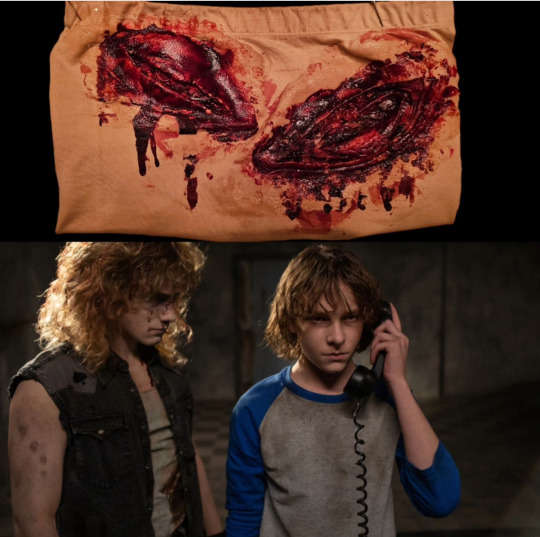
and he also has just like. minor bruising (like the fingerprints on his arm) and other random blood splatters on his face and neck (assuming the blood down his neck comes from wherever he was bleeding on his head) so Yeah overall very unpleasant way to die obviously
okay now the part thats actually in the movie and it only took me 13 paragraphs to get here: vance as a ghost!! first thing i wanna point out is appearance wise i just want to say that when he's a ghost he's missing his choker and that fact Pains me. anyway personality-wise i feel like being violently murdered has, understandably, kicked his rage up to like. the highest level it could possibly go. he's insanely snarky and downright rude to finney on the phone, showing no empathy to the fact that finney is literally in the exact situation he was in
i feel like the whole "this is the nightmare end of your pathetic little life" and "if you knew what you had coming, you'd be fucking terrified" thing is definitely to scare finney on purpose and to get him to do something, vance might as well have just told him he's never going home cuz thats how it came across LMAOO, it is startling though because vance is clearly speaking from experience, that he was literally fucking terrified, and he is warning finney in his own weird way
the thing i think sets vance apart from the other ghosts is that while he does help finney, he does it for a different reason than they do. the other ghosts want finney to escape, to get out, to be free, to live, but personally i dont think vance cares about that. the only thing he wants is for albert shaw to be dead, for someone to seek vengeance, to do what vance couldn't. vance doesn't care if it's bruce or robin or finney or whatever boy could've come after that, he doesnt care as long as that man gets what he deserves after what he put vance through, and i see this through the scene at the end of vance's call where finney thanks him for his help and vance says, and i quote, "helping you? this isn't about you, fuck him! and apologies for being repetitive but to me it just literally proves that to vance, this isnt about finney or his escape, its just about revenge
we dont get to find out what happens to the ghosts once the credits have rolled, and i dont think we quite know enough about tbp's version of ghosts to guess what theyre up to, but i have a few theories :3 maybe theyre no longer bound to those two houses and they can now go anywhere they want in town? or maybe since their shared goal of stopping albert has been achieved, the ghosts can finally pass on to whatever is waiting for them next. i dont think vance would be content to pass on that quickly or easily as anger lingers, but i hope he'd be able to let go of it eventually, and hey we might find out in the sequel. i pray it mentions him cuz i will just die if it doesnt
sometimes, ok thats a lie, frequently i think about an au where he survived or escaped or whatever but ohhhh boy this post is already a train wreck so that au would deserve its own essay of a post :3 if u actually genuinely read this far then Wtf thanks for reading the ramblings of an absolute madman, only pure delusion could get like 20 paragraphs about a guy with 6 minutes screentime but hey thats how i roll, thanks again to my pal gray for letting me rot and thank u to my other pal ana for also enduring all this rot
hope u enjoyed my interpretation of vance hopper im going to crawl in a hole now and probably brainrot some more, thanks again for ur time :3
#the black phone#tbp#tbp vance#vance hopper#character analysis#i literally rotted my entire brain for this one#normally i hate when ppl tag characters in a post that isnt really about them im gonna tag the other characters cuz i do mention them quite#a few times so apologies to ppl that are fans of anyone that isnt vance this post is Vance Centric#tbp robin#robin arellano#tbp finney#finney blake#tbp griffin#griffin stagg#tbp billy#billy showalter#tbp bruce#bruce yamada#tbp gwen#gwen blake#the grabber#albert shaw#the black phone 2022#i am the number 1 vance hopper fan and this proves it#if vance has 100 fans im one of them. if vance has 10 fans im one of them. if vance has 1 fan its me. if vance has no fans im dead.#sorry to everyone that followed me for total drama content i have an absolute disease for this movie and this guy#back to regularly scheduled content soon trust#not expecting this to do numbers cuz theres actually only like 4 tbp fans on earth but had to let two years worth#of absolute brainrot for this movie that has like. barely any merch and only the slightest scraps of fan content#i stayed up all night writing this
69 notes
·
View notes
Text
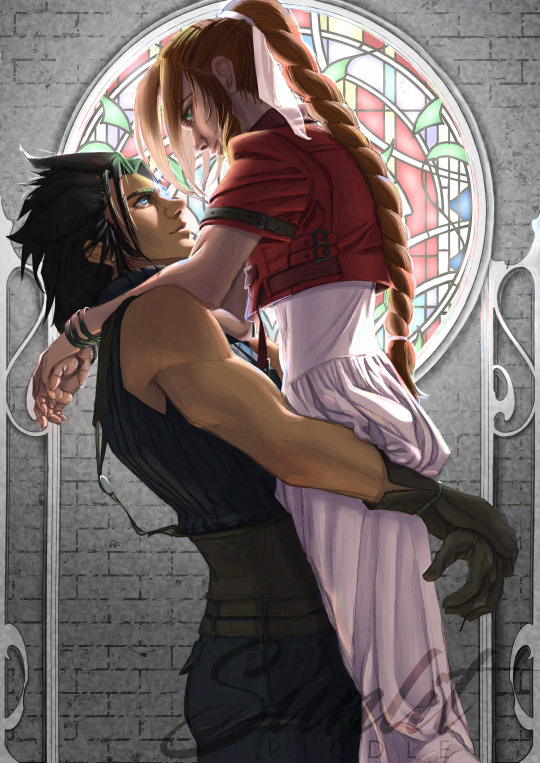
I might be a little excited for this game
#bre draws#final fantasy vii#ffvii#art#zack fair#aerith gainsborough#zackrith#zerith#i can't play until early next week for reasons outside of my control#I'm over here bullet-dodging spoilers#yes i understand this is a 25+ year old game and I've played it to death and resurrection#no spoilers just ships#I am probably gonna barf rainbows once I get my hands on this#ah yes reliving the years that I would have been an FFVII blog if tumblr had existed in the earliest aughts#apologies this will be my whole personality for a few months still
128 notes
·
View notes
Text
Anyways. Back before season three aired, my working theory for What Ted's Deal was - with his advice to Jamie, with the panic attacks that were layered Jamie and his son - that it would turn out that his late father had also been abusive, but that with his father's death Ted had never processed it.
Obviously the show didn't go that route, but in general these were the points that I was daisy-chaining together to build something of a narrative flow:
Ted preaches kindness and positivity but also struggles with his own repressed anger and inability to be direct in what he wants. He continually, pathologically, puts people before himself, to the point that it's becoming a breaking point in his marriage.
Ted repeatedly praises 'women' for being the more emotionally intelligent of the genders. He looks at toxic masculinity as not just a thing to be examined and overcome, but the root of why men struggle.
He himself is a product of the same toxic male behavior, and while he tries to lead by example as an individual, there's a part of that culture that he almost sees as... natural? Like a foregone conclusion. A lot of his methods for dealing with the team in season one happen within the same social boundaries he decries. If he can get Roy to step up, if he can get Roy and Jamie to stop fighting and call a truce, then everything else will fall in place, because men follow a hierarchical structure. This is How Locker Rooms Work, and-
I always go back to Jamie's first, open receptiveness to Ted's 'one in eleven' speech as the first sign that Ted doesn't know how to deal with things directly. This scene reads as Ted being very taken aback by Jamie's willingness to listen. It has shades of their later scene at the Crown & Anchor in it, with Ted being the one who pulls away from a conversation that has the ability of getting emotionally direct and real.
Ted's repressed anger. His shouting at Jamie in 1x06 over practice, but also his shouting at Nate when Nate tries to stuff the letter under his hotel room door.
Ted emotionally reaches for the bottle like. A noticeable amount of times. But especially when he's getting divorced.
Every Sunday afternoon Ted's father used to take him to a sports bar. From age of 10 til 16.
Ted's mom is completely incapable of being direct
Ted and his mom never processed or talked about his dad's death
Ted looks devastated when he sees Jamie with his father in the boot room, but ultimately walks away
Ted sends Jamie a token to show he's not alone (Ted soldier)
Next time Jamie tries to talk to Ted at the bar, Jamie opens with addressing the subject directly (the Ted soldier) and Ted deflects. Asks about City. Won't look him in the eye. Doesn't say anything to Jamie admitting he left City to piss off his dad. He just says that line about how sometimes having a tough dad is what makes you better.
He thought he knew what he was doing [about Jamie] but Sam 'went and unsettled it.' Some people aren't lucky enough to have good dads.
Ted welcomes Jamie back but keeps his distance (much more than in season 1).
Ted begins having panic attacks that feature Jamie and his son.
Ted admits panic attacks linked directly to his father's death.
So this takes us through season two, and at this point my working theory was what if it turned out that Ted most of Ted's Ted-ness had been an active effort on his own part to become something less like his own father? It would explain his disdain for male-coded behaviors while also explaining why he seems unable to truly break away from them. it would explain his people-pleasing habits (and meeting his mom and knowing she is also allergic to asking for things, I think this could still fit as a trauma response). It would explain his putting women on a pedestal, if he had a bad male role model to begin with. It would explain how his demeanor around Jamie changes so much when they have the 'tough dads' talk turning into something closed off when his body language with Jamie has always been open before (and there's a lovely parallel with how they're both sat at the bar in that shot too). Hell it would add additional weight to that talk if it turned out he was also speaking of himself. His panic attacks would make sense, seeing himself in Jamie but also his son and his own role as a dad.
That, plus Ted being a character we regularly see drinking something harder than wine or beer, usually when he's emotionally stressed. Plus Ted's dad bringing him to a sports bar every Sunday for years, and at a young age too. Plus Jamie's dad being an alcoholic. That's where I thought this was going- I thought it would turn out that the late Lasso had also been an alcoholic and a tough dad. It just seemed the obvious conclustion at the time, to make the Ted & Jamie parallel into a full parallel.
Then you add in the fact that Ted married his college sweetheart and then waited until they were in their thirties before having a kid (In the midwest. Where he definitely would've been pressured about it) and all of this to me added up to a troubled man who struggled with the idea of becoming a father long before he had a son. Someone who spent years creating a facade, pretending (like his mom) that things were okay. Someone who maybe never felt right blaming his dad for any of it, not when it became so clear at the end how much his dad was struggling.
Only to have that facade crumble the second someone else from similar circumstances showed up to challenge it.
His dad was a product of his time, the same way that Ted is a product of his dad, the same way men are just a product of toxic masculinity, and Ted doesn't know how to 'deal' with any of it but he'd thought he'd gotten to the point in life where he had some solutions. Only to find that those solutions didn't work when held up to a mirror.
So yeah. That was my theory. Then season three happened, and I realized that unfortunately my theory had a flaw. See, I was so busy looking for a Watsonian diagnosis that would make Ted's idiosyncrasies make sense, that I completely missed the fact that the problem was Doylist to begin with. The show writers never meant for us to read into all of that, because the show writers themselves didn't see anything contrary, worrisome, or tone-deaf about Ted's behavior. Not from a toxic masculinity standpoint, and certainly not from the standpoint of discussing abuse of a male character.
It's not Ted who dismisses Jamie's dad's abuse. It's the writers. Which unfortunately means, since Ted by extension is the show, that it is Ted. Which is why all of us are left watching scenes like the 'tough dads' scene or the Mom City scene and going-
What the hell, Ted?
#apologies if this is rather rambly#i think i lost the point a few times#anyways here. have an old theory that got axed with the rest of them#though I stand by the idea that Ted also had depression in season three#ted lasso#jamie tartt#ted lasso meta#cw suicide mention#for Ted's dad#cw abuse#for jamie and (in this version) ted's dad#this is the longer version of the previous post that I mentioned in the tags
92 notes
·
View notes
Text
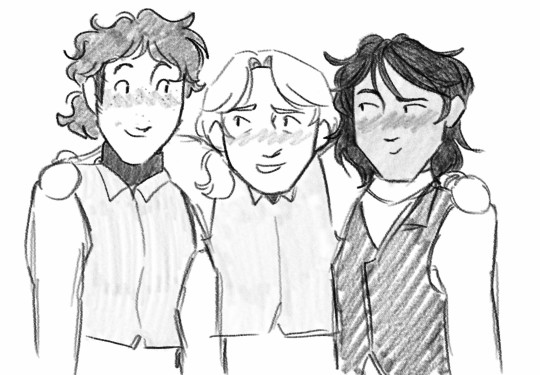
cuties (:
#I actually really like how this turned out.............#my art#temeraire#john granby#william laurence#tenzing tharkay#this picture is after a few drinks btw#I think Laurence secretly likes being touched but yk he's very stoic and he REFUSES to ask for it so everyone kind of assumes he doesn't??#but it. comes out a lil when he's drunk.#Tharkay is very unused to it but he's definitely not. opposed. to being touched. especially if its by Laurence...#Granby meanwhile does this all the time.#hes always falling asleep on people and clapping them on the shoulders and nudging them with his hip to get their attention#but it takes him like a bajillion years to hug Laurence for the first time cuz yk. Laurence is. Laurence.#and Laurence is also hesitant to initiate things like that bc he doesn't want to be weird (ITS NOT WEIRD TO HUG YOUR BEST FRIEND LAURENCE.)#tharkay meanwhile has never had very much desire to get close to someone physically or paid very much attention to it#and then he meets Laurence. who barely ever touches anyone. and suddenly whenever their hands brush tharkay is hyperaware of it#I have no idea what I'm saying#I've got a big fat cold and I deadass almost took my ADHD meds on accident instead of ibuprofen... it's 11pm.#that is to say. I'm a touch delirious#so I apologize sincerely if I completely mischaracterized them
48 notes
·
View notes
Text



today i blanked out and when i woke up its 12 am and realized i made all of these in one sitting
#first of all i apologize but at the same time im not sorry#Ibong Adarna is the book i used for Juan btw#because i had so much filipino literature book reports in the past few years that i might as well channel it into something#if you told me im going to use and turn this absurd piece of writing into a limbus company oc years ago while i was cramming my book report#i would have laughed and walked away#now look at booboo the fucking fool#limbus company#limbus company oc#lcb#meteo art#lcb heathcliff#<- forgot to tag this dude HAHA
288 notes
·
View notes
Text
Ed's had a rough day. Ed's had a rough couple of days. When he turns to his favorite stress-relief outlet, shopping at antique malls, it takes him to a shop he's never been before with the most beautiful man behind the counter he's ever seen. Ed might walk out of this shop with more than a few new figurines for his collection…
This is a sweet, flirty little modern meet-cute, rated T, 3.8k words. Check it out!
#ofmd#our flag means death#ofmd fic#my fics#i've had the absolute worst few days so i do apologize that the pwp fics i promised aren't ready yet#have this in the meantime#it's cute! it's sweet! you'll like it!
27 notes
·
View notes
Text
Twelve, Thirteen, and One
Words: 6k
Rating: G
Themes: Friendship, Self-Giving Love
(Written for the Four Loves Fairytale Retelling Challenge over at the @inklings-challenge! A Cinderella retelling feat. curious critters and a lot of friendship.)
When the clock chimes midnight on that third evening, thirteen creatures look to the girl who showed them all kindness.
—
It’s hours after dark, again, and the human girl still sleeps in the ashes.
The mice notice this—though it happens so often that they’ve ceased to pay attention to her. She smells like everything else in the hearth: ashy and overworked, tinged with the faint smell of herbs from the kitchen.
When she moves or shifts in her sleep (uncomfortable sleep—even they can sense the exhaustion in her posture as she sits slumped against the wall, more willing to seep up warmth from the stone than lie cold elsewhere this time of year), they simply scurry around her and continue combing for crumbs and seeds. They’d found a feast of lentils scattered about once, and many other times, the girl had beckoned them softly to her hand, where she’d held a little chunk of brown bread.
Tonight, she has nothing. They don’t mind—though three of them still come to sniff her limp hand where it lies drooped against the side of her tattered dress.
A fourth one places a little clawed hand on the side of her finger, leaning over it to investigate her palm for any sign of food.
When she stirs, it’s to the sensation of a furry brown mouse sitting in her palm.
It can feel the flickering of her muscles as she wakes—feeling slowly returning to her body. To her credit, she cracks her eyes open and merely observes it.
They’re all but tame by now. The Harsh-Mistress and the Shrieking-Girl and the Angry-Girl are to be avoided like the plague never was, but this girl—the Cinder-Girl, they think of her—is gentle and kind.
Even as she shifts a bit and they hear the dull crack of her joints, they’re too busy to mind. Some finding a few buried peas (there were always some peas or lentils still hidden here, if they looked carefully), some giving themselves an impromptu bath to wash off the dust. The one sitting on her hand is doing the latter, fur fluffed up as it scratches one ear and then scrubs tirelessly over its face with both paws.
One looks up from where it’s discovered a stray pea to check her expression.
A warm little smile has crept up her face, weary and dirty and sore as she seems to be. She stays very still in her awkward half-curl against stone, watching the mouse in her hand groom itself. The tender look about her far overwhelms—melts, even—the traces of tension in her tired limbs.
Very slowly, so much so that they really aren’t bothered by it, she raises her spare hand and begins lightly smearing the soot away from her eyes with the back of her wrist.
The mouse in her palm gives her an odd look for the movement, but has discovered her skin is warmer than the cold stone floor or the ash around the dying fire. It pads around in a circle once, then nudges its nose against her calloused skin, settling down for a moment.
The Cinder-Girl has closed her eyes again, and drops her other hand into her lap, slumping further against the wall. Her smile has grown even warmer, if sadder.
They decide she’s quite safe. Very friendly.
—
The old rat makes his rounds at the usual times of night, shuffling through a passage that leads from the ground all the way up to the attic.
When both gold sticks on the clocks’ moonlike faces point upward, there’s a faint chime from the tower-clock downstairs. He used to worry that the sound would rouse the humans. Now, he ignores it and goes about his business.
There’s a great treasury of old straw in the attic. It’s inside a large sack—and while this one doesn’t have corn or wheat like the ones near the kitchen sometimes do, he knows how to chew it open all the same.
The girl sleeps on this sack of straw, though she doesn’t seem to mind what he takes from it. There’s enough more of it to fill a hundred rat’s nests, so he supposes she doesn’t feel the difference.
Tonight, though—perhaps he’s a bit too loud in his chewing and tearing. The girl sits up slowly in bed, and he stiffens, teeth still sunk into a bit of the fabric.
“Oh.” says the girl. She smiles—and though the expression should seem threatening, all pulled mouth-corners and teeth, he feels the gentleness in her posture and wonders at novel thoughts of differing body languages. “Hello again. Do you need more straw?”
He isn’t sure what the sounds mean, but they remind him of the soft whuffles and squeaks of his siblings when they were small. Inquisitive, unafraid. Not direct or confrontational.
She’s seemed safe enough so far—almost like the woman in white and silver-gold he’s seen here sometimes, marveling at his own confidence in her safeness—so he does what signals not-afraid the best to his kind. He glances her over, twitches his whiskers briefly, and goes back to what he was doing.
Some of the straw is too big and rough, some too small and fine. He scratches a bundle out into a pile so he can shuffle through it. It’s true he doesn’t need much, but the chill of winter hasn’t left the world yet.
The girl laughs. The sound is soft and small. It reminds him again of young, friendly, peaceable.
“Take as much as you need,” she whispers. Her movements are unassuming when she reaches for something on the old wooden crate she uses as a bedside table. With something in hand, she leans against the wall her bed is a tunnel’s-width from, and offers him what she holds. “Would you like this?”
He peers at it in the dark, whiskers twitching. His eyesight isn’t the best, so he finds himself drawing closer to sniff at what she has.
It’s a feather. White and curled a bit, like the goose-down he’d once pulled out the corner of a spare pillow long ago. Soft and long, fluffy and warm.
He touches his nose to it—then, with a glance upward at her softly-smiling face, takes it in his teeth.
It makes him look like he has a mustache, and is a bit too big to fit through his hole easily. The girl giggles behind him as he leaves.
—
There’s a human out in the gardens again. Which is strange—this is a place for lizards, maybe birds and certainly bugs. Not for people, in his opinion. She’s not dressed in venomous bright colors like the other humans often are, but neither does she stay to the manicured garden path the way they do.
She doesn’t smell like unnatural rotten roses, either. A welcome change from having to dart for cover at not just the motions, but the stenches that accompany the others that appear from time to time.
This human is behind the border-shubs, beating an ornate rug that hangs over the fence with a home-tied broom. Huge clouds of dust shake from it with each hit, settling in a thin film on the leaves and grass around her.
She stops for a moment to press her palm to her forehead, then turns over her shoulder and coughs into her arm.
When she begins again, it’s with a sharp WHOP.
He jumps a bit, but only on instinct. However—
A few feet from where he settles back atop the sunning-rock, there’s a scuffle and a sharp splash. Then thrashing—waster swashing about with little churns and splishes.
It’s not the way of lizards to think of doing anything when one falls into the water. There were several basins for fish and to catch water off the roof for the garden—they simply had to not fall into them, not drown. There was little recourse for if they did. What could another lizard do, really? Fall in after them? Best to let them try to climb out if they could.
The girl hears the splashing. She stares at the water pot for a moment.
Then, she places her broom carefully on the ground and comes closer.
Closer. His heart speeds up. He skitters to the safety of a plant with low-hanging leaves—
—and then watches as she walks past his hiding place, peers into the basin, and reaches in.
Her hand comes up dripping wet, a very startled lizard still as a statue clinging to her fingers.
“Are you the same one I always find here?” she asks with a chiding little smile. “Or do all of you enjoy swimming?”
When she places her hand on the soft spring grass, the lizard darts off of it and into the underbrush. It doesn’t go as far as it could, though—something about this girl makes both of them want to stand still and wait for what she’ll do next.
The girl just watches it go. She lets out a strange sound—a weary laugh, perhaps—and turns back to her peculiar chore.
—
A song trails through the old house—under the floorboards—through the walls—into the garden, beneath the undergrowth—and lures them out of hiding.
It isn’t an audible song, not like that of the birds in the summer trees or the ashen-girl murmuring beautiful sounds to herself in the lonely hours. This one was silent. Yet, it reached deep down into their souls and said come out, please—the one who helped you needs your help.
It didn’t require any thought, no more than eat or sleep or run did.
In chains of silver and grey, all the mice who hear it converge, twenty-four tiny feet pattering along the wood in the walls. The rat joins them, but they are not afraid.
When they emerge from a hole out into the open air, the soft slip-slap of more feet surround them. Six lizards scurry from the bushes, some gleaming wet as if they’d just escaped the water trough or run through the birdbath themselves.
As a strange little hoard, they approach the kind girl. Beside her is a tall woman wearing white and silver and gold.
The girl—holding a large, round pumpkin—looks surprised to see them here. The woman is smiling.
“Set the pumpkin on the drive,” the woman says, a soft gleam in her eye. “The rest of you, line up, please.”
Bemused, but with a heartbeat fast enough for them to notice, the girl gingerly places the pumpkin on the stone of the drive. It’s natural for them, somehow, to follow—the mice line in pairs in front of it, the rat hops on top of it, and the lizards all stand beside.
“What are they doing?” asks the girl—and there’s curiosity and gingerness in her tone, like she doesn’t believe such a sight is wrong, but is worried it might be.
The older woman laughs kindly, and a feeling like blinking hard comes over the world.
It’s then—then, in that flash of darkness that turns to dazzling light, that something about them changes.
“Oh!” exclaims the girl, and they open their eyes. “Oh! They’re—“
They’re different.
The mice aren’t mice at all—and suddenly they wonder if they ever were, or if it was an odd dream.
They’re horses, steel grey and sleek-haired with with silky brown manes and tails. Their harnesses are ornate and stylish, their hooves polished and dark.
Instead of a rat, there’s a stout man in fine livery, with whiskers dark and smart as ever. He wears a fine cap with a familiar white feather, and the gleam in his eye is surprised.
“Well,” he says, examining his hands and the cuffs of his sleeves, “I suppose I won’t be wanting for adventure now.”
Instead of six lizards, six footmen stand at attention, their ivory jackets shining in the late afternoon sun.
The girl herself is different, though she’s still human—her hair is done up beautifully in the latest fashion, and instead of tattered grey she wears a shimmering dress of lovely pale green, inlaid with a design that only on close inspection is flowers.
“They are under your charge, now,” says the woman in white, stepping back and folding her hands together. “It is your responsibility to return before the clock strikes midnight—when that happens, the magic will be undone. Understood?”
“Yes,” says the girl breathlessly. She stares at them as if she’s been given the most priceless gift in all the world. “Oh, thank you.”
—
The castle is decorated brilliantly. Flowery garlands hang from every parapet, beautiful vines sprawling against walls and over archways as they climb. Dozens of picturesque lanterns hang from the walls, ready to be lit once the sky grows dark.
“It’s been so long since I’ve seen the castle,” the girl says, standing one step out of the carriage and looking so awed she seems happy not to go any further. “Father and I used to drive by it sometimes. But it never looked so lovely as this.”
“Shall we accompany you in, milady?” asks one of the footmen. They’re all nearly identical, though this one has freckles where he once had dark flecks in his scales.
She hesitates for only a moment, looking up at the pinnacles of the castle towers. Then, she shakes her head, and turns to look at them all with a smile like the sun.
“I think I’ll go in myself,” she says. “I’m not sure what is custom. But thank you—thank you so very much.”
And so they watch her go—stepping carefully in her radiant dress that looked lovelier than any queen’s.
Though she was not royal, it seemed there was no doubt in anyone’s minds that she was. The guards posted at the door opened it for her without question.
With a last smile over her shoulder, she stepped inside.
—
He's straightening the horses' trappings for the fifth time when the doors to the castle open, and out hurries a figure. It takes him a moment to recognize her, garbed in rich fabrics and cloaked in shadows, but it's the girl, rushing out to the gilded carriage. A footman steps forward and offers her a hand, which she accepts gratefully as she steps up into the seat.
“Enjoyable evening, milady?” asks the coachman. His whiskers are raised above the corners of his mouth, and his twinkling eyes crinkle at the edges.
“Yes, quite, thank you!” she breathes in a single huff. She smooths her dress the best she can before looking at him with some urgency. “The clock just struck quarter till—will you be able to get us home?”
The gentle woman in white had said they only would remain in such states until midnight. How long was it until the middle of night? What was a quarter? Surely darkness would last for far more hours than it had already—it couldn’t be close. Yet it seemed as though it must be; the princesslike girl in the carriage sounded worried it would catch them at any moment.
“I will do all I can,” he promises, and with a sharp rap of the reins, they’re off at a swift pace.
They arrive with minutes to spare. He knows this because after she helps him down from the carriage (...wait. That should have been the other way around! He makes mental note for next time: it should be him helping her down. If he can manage it. She’s fast), she takes one of those minutes to show him how his new pocketwatch works.
He’s fascinated already. There’s a part of him that wonders if he’ll remember how to tell time when he’s a rat again—or will this, all of this, be forgotten?
The woman in white is there beside the drive, and she’s already smiling. A knowing gleam lights her eye.
“Well, how was the ball?” she asks, as Cinder-Girl turns to face her with the most elated expression. “I hear the prince is looking for fair maidens. Did he speak with you?”
The girl rushes to grasp the woman’s hands in hers, clasping them gratefully and beaming up at her.
“It was lovely! I’ve never seen anything so lovely,” she all but gushes, her smile brighter and broader than they’d ever seen it. “The castle is beautiful; it feels so alive and warm. And yes, I met the Prince—although hush, he certainly isn’t looking for me—he’s so kind. I very much enjoyed speaking with him. He asked me to dance, too; I had as wonderful a time as he seemed to. Thank you! Thank you dearly.”
The woman laughs gently. It isn’t a laugh one would describe as warm, but neither is it cold in the sense some laughs can be—it's soft and beautiful, almost crystalline.
“That’s wonderful. Now, up to bed! You’ve made it before midnight, but your sisters will be returning soon.”
“Yes! Of course,” she replies eagerly—turning to smile gratefully at coachman and stroke the nearest horses on their noses and shoulders, then curtsy to the footmen. “Thank you all, very much. I could not ask for a more lovely company.”
It’s a strange moment when all of their new hearts swell with warmth and affection for this girl—and then the world darkens and lightens so quickly they feel as though they’ve fallen asleep and woken up.
They’re them again—six mice, six lizards, a rat, and a pumpkin. And a tattered gray dress.
“Please, would you let me go again tomorrow? The ball will last three days. I had such a wonderful time.”
“Come,” the woman said simply, “and place the pumpkin beneath the bushes.”
The woman in white led the way back to the house, followed by an air-footed girl and a train of tiny critters. There was another silent song in the air, and they thought perhaps the girl could hear it too: one that said yes—but get to bed!
—
The second evening, when the door of the house thuds shut and the hoofsteps of the family’s carriage fade out of hearing, the rat peeks out of a hole in the kitchen corner to see the Cinder-Girl leap to her feet.
She leans close to the window and watched for more minutes than he quite understands—or maybe he does; it was good to be sure all cats had left before coming out into the open—and then runs with a spring in her step to the back door near the kitchen.
Ever so faintly, like music, the woman’s laughter echoes faintly from outside. Drawn to it like he had been drawn to the silent song, the rat scurries back through the labyrinth of the walls.
When he hurries out onto the lawn, the mice and lizards are already there, looking up at the two humans expectantly. This time, the Cinder-Girl looks at them and smiles broadly.
“Hello, all. So—how do you do it?” she asks the woman. Her eyes shine with eager curiosity. “I had no idea you could do such a thing. How does it work?”
The woman fixes her with a look of fond mock-sternness. “If I were to explain to you the details of how, I’d have to tell you why and whom, and you’d be here long enough to miss the royal ball.” She waves her hands she speaks. “And then you’d be very much in trouble for knowing far more than you ought.”
The rat misses the girl’s response, because the world blinks again—and now all of them once again are different. Limbs are long and slender, paws are hooves with silver shoes or feet in polished boots.
The mouse-horses mouth at their bits as they glance back at the carriage and the assortment of humans now standing by it. The footmen are dressed in deep navy this time, and the girl wears a dress as blue as the summer sky, adorned with brilliant silver stars.
“Remember—“ says the woman, watching fondly as the Cinder-Girl steps into the carriage in a whorl of beautiful silk. “Return before midnight, before the magic disappears.”
“Yes, Godmother,” she calls, voice even more joyful than the previous night. “Thank you!”
—
The castle is just as glorious as before—and the crowd within it has grown. Noblemen and women, royals and servants, and the prince himself all mill about in the grand ballroom.
He’s unsure of the etiquette, but it seems best for her not to enter alone. Once he escorts her in, the coachman bows and watches for a moment—the crowd is hushed again, taken by her beauty and how important they think her to be—and then returns to the carriage outside.
He isn’t required in the ballroom for much of the night—but he tends to the horses and checks his pocketwatch studiously, everything in him wishing to be the best coachman that ever once was a rat.
Perhaps that wouldn’t be hard. He’d raise the bar, then. The best coachman that ever drove for a princess.
Because that was what she was—or, that was what he heard dozens of hushed whispers about once she’d entered the ball. Every noble and royal and servant saw her and deemed her a grand princess nobody knew from a land far away. The prince himself stared at her in a marveling way that indicated he thought no differently.
It was a thing more wondrous than he had practice thinking. If a mouse could become a horse or a rat could become a coachman, couldn’t a kitchen-girl become a princess?
The answer was yes, it seemed—perhaps in more ways than one.
She had rushed out with surprising grace just before midnight. They took off quickly, and she kept looking back toward the castle door, as if worried—but she was smiling.
“Did you know the Prince is very nice?” she asks once they’re safely home, and she’s stepped down (drat) without help again. The woman in white stands on her same place beside the drive, and when Cinder-Girl sees her, she waves with dainty grace that clearly holds a vibrant energy and sheer thankfulness behind it. “I’ve never known what it felt like to be understood. He thinks like I do.”
“How is that?” asks the woman, quirking an amused brow. “And if I might ask, how do you know?”
“Because he mentions things first.” The girl tries to smother some of the wideness of her smile, but can’t quite do so. “And I've shared his thoughts for a long time. That he loves his father, and thinks oranges and citrons are nice for festivities especially, and that he’s always wanted to go out someday and do something new.”
—
The third evening, the clouds were dense and a few droplets of rain splattered the carriage as they arrived.
“Looks like rain, milady,” said the coachman as she disembarked to stand on water-spotted stone. “If it doesn’t blow by, we’ll come for ye at the steps, if it pleases you.”
“Certainly—thank you,” she replies, all gleaming eyes and barely-smothered smiles. How her excitement to come can increase is beyond them—but she seems more so with each night that passes.
She has hardly turned to head for the door when a smattering of rain drizzles heavily on them all. She flinches slightly, already running her palms over the skirt of her dress to rub out the spots of water.
Her golden dress glisters even in the cloudy light, and doesn’t seem to show the spots much. Still, it’s hardy an ideal thing.
“One of you hold the parasol—quick about it, now—and escort her inside,” the coachman says quickly. The nearest footman jumps into action, hop-reaching into the carriage and falling back down with the umbrella in hand, unfolding it as he lands. “Wait about in case she needs anything.”
The parasol is small and not meant for this sort of weather, but it's enough for the moment. The pair of them dash for the door, the horses chomping and stamping behind them until they’re driven beneath the bows of a huge tree.
The footman knows his duty the way a lizard knows to run from danger. He achieves it the same way—by slipping off to become invisible, melting into the many people who stood against the golden walls.
From there, he watches.
It’s so strange to see the way the prince and their princess gravitate to each other. The prince’s attention seems impossible to drag away from her, though not for many’s lack of trying.
Likewise—more so than he would have thought, though perhaps he’s a bit slow in noticing—her focus is wholly on the prince for long minutes at a time.
Her attention is always divided a bit whenever she admires the interior of the castle, the many people and glamorous dresses in the crowd, the vibrant tables of food. It’s all very new to her, and he’s not certain it doesn’t show. But the Prince seems enamored by her delight in everything—if he thinks it odd, he certainly doesn’t let on.
They talk and laugh and sample fine foods and talk to other guests together, then they turn their heads toward where the musicians are starting up and smile softly when they meet each other’s eyes. The Prince offers a hand, which is accepted and clasped gleefully.
Then, they dance.
Their motions are so smooth and light-footed that many of the crowd forgo dancing, because admiring them is more enjoyable. They’re in-sync, back and forth like slow ripples on a pond. They sometimes look around them—but not often, especially compared to how long they gaze at each other with poorly-veiled, elated smiles.
The night whirls on in flares of gold tulle and maroon velvet, ivory, carnelian, and emerald silks, the crowd a nonstop blur of color.
(Color. New to him, that. Improved vision was wonderful.)
The clock strikes eleven, but there’s still time, and he’s fairly certain he won’t be able to convince the girl to leave anytime before midnight draws near.
He was a lizard until very recently. He’s not the best at judging time, yet. Midnight does draw near, but he’s not sure he understands how near.
The clock doesn’t quite say up-up. So he still has time. When the rain drums ceaselessly outside, he darts out and runs in a well-practiced way to find their carriage.
—
Another of the footmen comes in quickly, having been sent in a rush by the coachman, who had tried to keep his pocketwatch dry just a bit too long. He’s soaking wet from the downpour when he steps close enough to get her attention.
She sees him, notices this, and—with a glimmer of recognition and amusement in her eyes—laughs softly into her hand.
ONE—TWO— the clock starts. His heart speeds up terribly, and his skin feels cold. He suddenly craves a sunny rock.
“Um,” he begins awkwardly. Lizards didn’t have much in the way of a vocal language. He bows quickly, and water drips off his face and hat and onto the floor. “The chimes, milady.”
THREE—FOUR—
Perhaps she thought it was only eleven. Her face pales. “Oh.”
FIVE—SIX—
Like a deer, she leaps from the prince’s side and only manages a stumbling, backward stride as she curtsies in an attempt at a polite goodbye.
“Thank you, I must go—“ she says, and then she’s racing alongside the footman as fast as they both can go. The crowd parts for them just enough, amidst loud murmurs of surprise.
SEVEN—EIGHT—
“Wait!” calls the prince, but they don’t. Which hopefully isn’t grounds for arrest, the footman idly thinks.
They burst through the door and out into the open air.
NINE—TEN—
It has been storming. The rain is crashing down in torrents—the walkways and steps are flooded with a firm rush of water.
She steps in a crevice she couldn’t see, the water washes over her feet, and she stumbles, slipping right out of one shoe. There’s noise at the door behind them, so she doesn’t stop or even hesitate. She runs at a hobble and all but dives through the open carriage door. The awaiting footman quickly closes it, and they’re all grasping quickly to their riding-places at the corners of the vehicle.
ELEVEN—
A flash of lightning coats the horses in white, despite the dark water that’s soaked into their coats, and with a crack of the rains and thunder they take off at a swift run.
There’s shouting behind them—the prince—as people run out and call to the departing princess.
TWELVE.
Mist swallows them up, so thick they can’t hear or see the castle, but the horses know the way.
The castle’s clock tower must have been ever-so-slightly fast. (Does magic tell truer time?) Their escape works for a few thundering strides down the invisible, cloud-drenched road—until true midnight strikes a few moments later.
—
She walks home in the rain and fog, following a white pinprick of light she can guess the source of—all the while carrying a hollow pumpkin full of lizards, with an apron pocket full of mice and a rat perched on her shoulder.
It’s quite the walk.
—
The prince makes a declaration so grand that the mice do not understand it. The rat—a bit different now—tells them most things are that way to mice, but he’s glad to explain.
The prince wants to find the girl who wore the golden slipper left on the steps, he relates. He doesn’t want to ask any other to marry him, he loved her company so.
The mice think that’s a bit silly. Concerning, even. What if he does find her? There won’t be anyone to secretly leave seeds in the ashes or sneak them bread crusts when no humans are looking.
The rat thinks they’re being silly and that they’ve become too dependent on handouts. Back in his day, rodents worked for their food. Chewing open a bag of seed was an honest day’s work for its wages.
Besides, he confides, as he looks again out the peep-hole they’ve discovered in the floor trim of the parlor. You’re being self-interested, if you ask me. Don’t you want our princess to find a good mate, and live somewhere spacious and comfortable, free of human-cats, where she’d finally have plenty to eat?
It’s hard to make a mouse look appropriately chastised, but that question comes close. They shuffle back a bit to let him look out at the strange proceedings in the parlor again.
There are many humans there. The Harsh-Mistress stands tall and rigid at the back of one of the parlor chairs, exchanging curt words with a strange man in fine clothes with a funny hat. Shrieking-Girl and Angry-Girl stand close, scoffing and laughing, looking appalled.
Cinder-Girl sits on the chair that’s been pulled to the middle of the room. She extends her foot toward a strange golden object on a large cushion.
The shoe, the rat notes so the mice can follow. They can’t quite see it from here—poor eyesight and all.
Of course, the girl’s foot fits perfectly well into her own shoe. They all saw that coming.
Evidently, the humans did not. There’s absolute uproar.
“There is no possible way she’s the princess you’re looking for!” declares Harsh-Mistress, her voice full of rage. “She’s a kitchen maid. Nothing royal about her.”
“How dare you!” Angry-Girl rages. “Why does it fit you? Why not us?”
“You sneak!” shrieks none other than Shrieking-Girl. “Mother, she snuck to the ball! She must have used magic, somehow! Princes won’t marry sneaks, will they?”
“I think they might,” says a calm voice from the doorway, and the uproar stops immediately.
The Prince steps in. He stares at Cinder-Girl.
She stares back. Her face is still smudged with soot, and her dress is her old one, gray and tattered. The golden slipper gleams on her foot, having fit as only something molded or magic could.
A blush colors her face beneath the ash and she leaps up to do courtesy. “Your Highness.”
The Prince glances at the messenger-man with the slipper-pillow and the funny hat. The man nods seriously.
The Prince blinks at this, as if he wasn’t really asking anything with his look—it’s already clear he recognizes her—and meets Cinder-Girl’s gaze with a smile. It’s the same half-nervous, half-attemptingly-charming smile as he kept giving her at the ball.
He bows to her and offers a hand. (The rat has to push three mice out of the way to maintain his view.)
“It’s my honor,” he assures her. “Would you do me the great honor of accompanying me to the castle? I’d had a question in mind, but it seems there are—“ he glances at Harsh-Mistress, who looks like a very upset rat in a mousetrap. “—situations we might discuss remedying. You’d be a most welcome guest in my father’s house, if you’d be amenable to it?”
It’s all so much more strange and unusual than anything the creatures of the house are used to seeing. They almost don’t hear it, at first—that silent song.
It grows stronger, though, and they turn their heads toward it with an odd hope in their hearts.
—
The ride to the castle is almost as strange as that prior walk back. The reasons for this are such:
One—their princess is riding in their golden carriage alongside the prince, and their chatter and awkward laughter fills the surrounding spring air. They have a good feeling about the prince, now, if they didn’t already. He can certainly take things in stride, and he is no respecter of persons. He seems just as elated to be by her side as he was at the ball, even with the added surprise of where she'd come from.
Two—they have been transformed again, and the woman in white has asked them a single question: Would you choose to stay this way?
The coachman said yes without a second thought. He’d always wanted life to be more fulfilling, he confided—and this seemed a certain path to achieving that.
The footmen might not have said yes, but there was something to be said for recently-acquired cognition. It seemed—strange, to be human, but the thought of turning back into lizards had the odd feeling of being a poor choice. Baffled by this new instinct, they said yes.
The horses, of course, said things like whuff and nyiiiehuhum, grumph. The woman seemed to understand, though. She touched one horse on the nose and told it it would be the castle’s happiest mouse once the carriage reached its destination. The others, it seemed, enjoyed their new stature.
And three—they are heading toward a castle, where they have all been offered a fine place to live. The Prince explains that he doesn’t wish for such a kind girl to live in such conditions anymore. There’s no talk of anyone marrying—just discussions of rooms and favorite foods and of course, you’ll have the finest chicken pie anytime you’d like and I can’t have others make it for me! Lend me the kitchens and I’ll make some for you; I have a very dear recipe. Perhaps you can help. (Followed in short order by a ...Certainly, but I’d—um, I’d embarrass myself trying to cook. You would teach me? and a gentle laugh that brightened the souls of all who could hear it.)
“If you’d be amenable to it,” she replies—and in clear, if surprised, agreement, the Prince truly, warmly laughs.
“Milady,” the coachman calls down to them. “Your Highness. We’re here.”
The castle stands shining amber-gold in the light of the setting sun. It will be the fourth night they’ve come here—the thirteen of them and the one of her—but midnight, they realize, will not break the spell ever again.
One by one, they disembark from the carriage. If it will stay as it is or turn back into a pumpkin, they hadn't thought to ask. There’s so much warmth swelling in their hearts that they don’t think it matters.
The girl, their princess, smiles—a dear, true smile, tentative in the face of a brand new world, but bright with hope—and suddenly, they’re all smiling too.
She steps forward, and they follow. The prince falls into step with her and offers an arm, and their glances at each other are brimming with light as she accepts.
With her arm in the arm of the prince, a small crowd of footmen and the coachman trailing behind, and a single grey mouse on her shoulder, the once-Cinder-Girl walks once again toward the palace door.
#Well this wasn't my first Cinderella retelling idea that I was excited about BUT -#since that one was turning into a tangle of Too Much Going On (though it's currently at 5k and maybe 70% done; I still plan to finish it)#I tried this one instead!#pros: I think I actually wrote myself out of writer's block? Which is AWESOME#And I feel like I'm starting to notice what needs fixed and mended about my writing; which is very helpful!#cons: due to having the additional pro of a very socially growth-filled few weeks IRL; I did not do much about that fact#please excuse the general lack of editing thus far#I have also learned that I may want to be at least a Level 5 Fairy Tale Reteller#before I tackle stories with hundreds of years of popular retellings and versions?#Although this one came much more easily than my first idea; it still felt more difficult to write than my Nix Nought Nothing story.#So another pro - I learned that I enjoy writing about lesser-known tales the most! Next time I might try a fun obscure one.#All in all this was a ton of fun!! Thanks for running the challenge! Apologies for being nearly late - I had a wonderful time!#I hope you all enjoy! <3#inklingschallenge#four loves fairy tale retelling challenge#love: philia#love: agape#Cinderella#story: complete#basil writes#salt and light
36 notes
·
View notes
Text
hi

#hi#i am just popping on here for a second bc i’m not in the mood to be back yet but my queue is getting quite full#so i think i might have to unpause it soon#maybe tomorrow idk yet#just a heads up in case i seem active again i’m not really i just had a lot of stuff piling up 😭#it will be a Huge shuffled mess so patience is appreciated!!#i apologize if you’re waiting on me but thank you for waiting regardless#please keep using my tracked tag for your creations#i will be back for real eventually#my mental health is quite terrible lately i still need time#it’s about to be a year since the last time i saw my sister before she passed so like. my grief is going through a crazy stage#i’m still not getting a ton of sleep#my brain is just Bad things all day#it’s all just really sucky but i’m trying to do my best 🙃#i hope you are all well i miss you#i will respond to messages at some point too#there are very few which..well it puts things into perspective and validates certain feelings ig lol#it’s all good that’s something i’m working on internally#hopefully i get there#bye again for now 💕
23 notes
·
View notes
Text
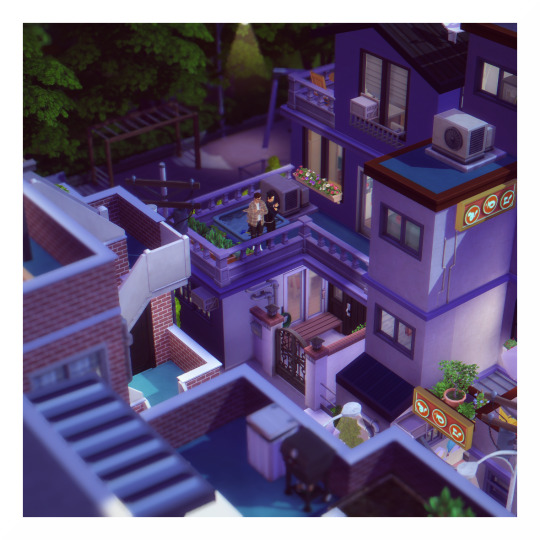
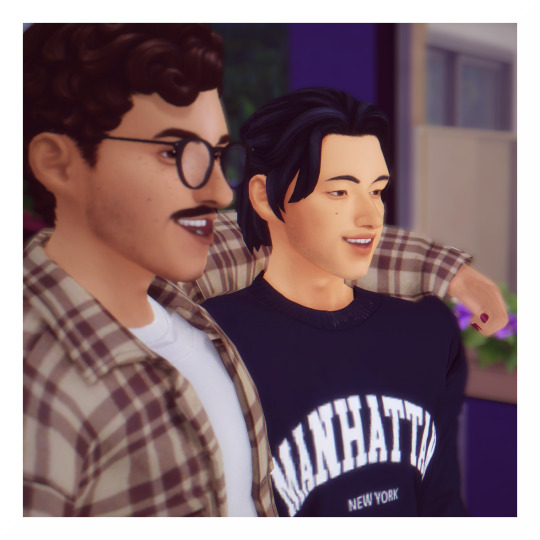
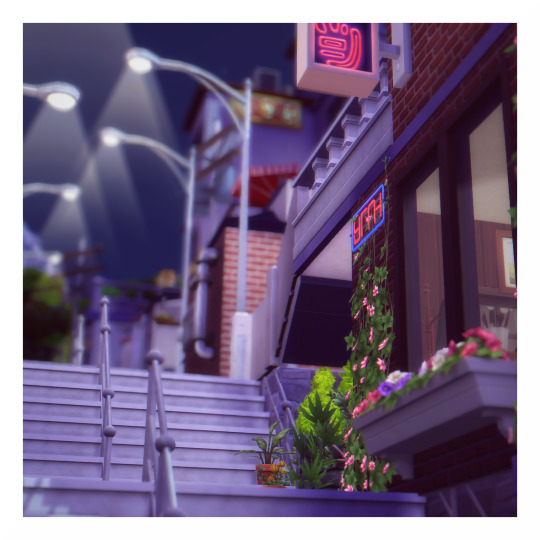
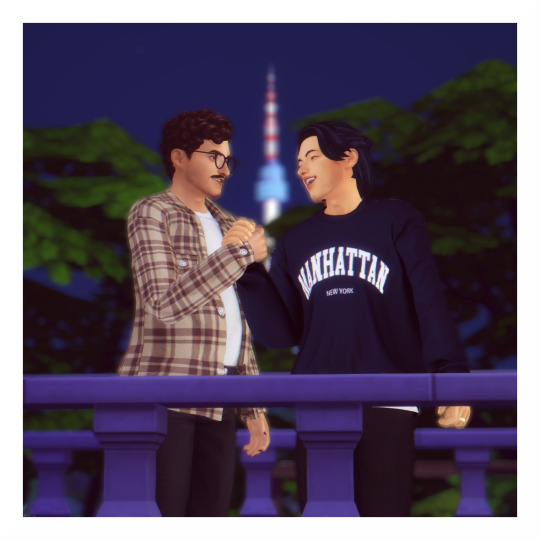
next // previous
august 16, 2021
11:00 p.m.
grandma ong's house
there’s a strangeness to a quiet enclave in a bustling metropolis, unexpected in the same manner as grant and henry’s long, unbroken brotherhood. nothing about the baseline rustle of neighbors carrying in paper grocery sacks and kids kicking a soccer ball resembles the eternal merry-go-round of life–max-capacity subway cars, clueless and loud tourists, and locals who drift through their day–just down the road. and yet above this neighborhood–and the entire sprawling city–hangs a common thread, a bluish hazy night sky.
“that was wild,” henry says, suppressed laughter bursting forth from deep in his chest, “all day everyone’s defaulted to speaking english because, well, look at you, and you even had me fooled. i actually forgot you kind of speak basic korean."
“the inner machinations of my mind are an enigma.”
henry rolls his eyes dramatically but in the same split second, throws an arm around grant’s shoulders.
“i was afraid that soup was going to fly out of your mouth.” grant returns the gesture, though it requires him to lean down so as to not smother henry’s face instead. “too close for comfort.”
“well, in my defense, i was not expecting you to reply to my grandma asking me, “daehyun, i haven’t seen your friend since your wedding. how did you meet again?”
grant shrugs. “we met on a playground twenty-four years ago.”
“on my very first weekend as a resident of the semi-good ol’ US of A. in the opposite situation. i remember being so pissed that my parents made me go out to ‘make friends’ that weekend. not moving, mind you, but making friends. i guess they were psychics, though, because apparently, it didn’t bother you that i didn’t speak your language for at least a couple weeks.”
“people say i could talk to a wall.”
henry laughs again. “you could. you’re very chatty.”
“did it bother you that i wrote you some really, really, really shitty letters in korean in the early days based on online translations i found?”
“no, that was sweet.” no question about it–the joy in henry’s eyes is determined. “they were definitely horrendous, but it’s the thought that counted. you could do better now. oh, and i think i still have all those letters. i should. i did box them up when i moved out of my parents’ house.”
they were, all things considered, never very much alike, beyond the fact they both liked cats but weren’t allowed to have any. henry’s mom was allergic, but grant’s parents despised pets. otherwise, they were polar opposites. grant always liked math and science, wanted to work with airplanes, and preferred to spend his free time with others playing tabletop RPGs and computer games; henry always liked art and history, wanted to be a photographer, and preferred to be left alone to his vintage film camera and pottery. grant’s parents raged when he selected aviation over medicine; henry’s parents and grandparents, all artists, were delighted by his dreams of photography. moreover, grant selectively speaks his mind, while henry rarely minces words.
and still–
the shrill honk of a car off in the distance disturbs grant’s thoughts.
“you really could talk to a wall, but hey, why did you approach me on the swing set that day? you were already busy hanging out with your sisters. and your cousins. why me?”
and still, the two have fused into one. the world turned upside down; grant paints these days, henry has long been a willing dungeons and dragons player, and separation from one another is like losing half your body. if henry walked away now–ended this messy half-hug early–grant would turn to ash.
“well,” grant begins, drawing out the suspense with an exaggerated sigh, “first of all...”
#ts4#the sims 4#sims 4#sims 4 story#sims 4 storytelling#simblr#hlcn: everything the stars promised#holocene.docx#holocene.png#hlcn: grant#hlcn: henry#it's been a WHILE since i've done a text-based update on this story so i apologize if the tone is off at all#then again this story has undergone quite a few stylistic changes and there's nothing wrong with that#btw i haven't even written anything outside of academic papers in so long i just have not had the spark or energy for a long time#so i'm kind of proud of this bc it took more effort than usual#wow i miss creative writing being 100% instinctual to me jdsfdsklfds burnout is so real y'all and it's got HANDSSSS#insert a NONE OF THIS IS ABOUT THIS PARTICULAR MOMENT IT'S ABOUT THEIR WHOLE FRIENDSHIP comment#hehehehe i love setting up future posts :3 i love foreshadowing :3#also yes we wait to find out the answer to that last question :) but it's coming#aaaaand we will find out more about henry i promise this isn't it
39 notes
·
View notes
Text
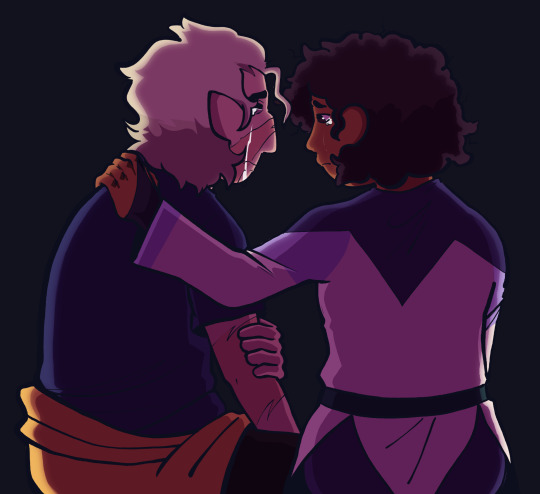

[ID: a digital illustration of Luz and Hunter from the owl house. Luz sits on the right with her hand on hunter's shoulder. Hunter sits on the left facing Luz. They're both in their designs from the end of Thanks to Them. Hunter has his eyes closed and is crying with a pained expression, while Luz looks on with tears in her eyes. The background is dark and the scene is dimly lit. The second image is a variation on the first image where a spectral version of flapjack sits on hunter's shoulder and Manny's hand in on Luz's shoulder. End ID]
Felt like posting something devious today. Do you think they'll ever talk about what they've lost? Bond over it? Mourn??? Grieve????
#the owl house#toh#hunter toh#luz noceda#hunter noceda#flapjack toh#(BARELY i did not put the effort into that bird that i should've)#manny noceda#(also barely but I feel like it's more obvious here)#i sketched this out months ago when TTT first aired but the lines were giving me trouble and i shelved it#until now when i really just wanted to finish something but wasn't happy with any of my sketches#it was inspired by the interview dana did where she said grief would be a major theme of season 3#both bc it scared me and also bc it made me start thinking ''hm okay. which characters are grieving rn and how might they interact?''#my money's still on darius if hunter does get to talk through some of his grief in the next few eps#(just to tie a nice bow on their relationship and maybe dicuss the previous gg a bit more and flesh darius' motives out)#but like. luz is his sister. grief is sooo central to her arc as well it's like. even if they don't get time in canon#(which is understandable. they do not have a lot of time rn for extended fanfic-esque character exploration conversations)#but that doesn't mean i can't rotate the idea in my mind at terminal velocity until i get sick#i would apologize for not posting festive art at this time of year rn BUT YKNOW WHAT. I'VE HAD A ROUGH COUPLE OF HOLIDAY SEASONS#THIS COUNTS AS FESTIVE FOR ME!#it's getting better this year though. slowly#anyway this piece isn't perfect and there's a few bits I'm not happy w/ that i could've spent more time on#but to my own credit i pushed myself to use reference and do a (albeit simple) pose I don't normally do!#so props to me in that sense#anyway happy holidays! think abt these devastatingly sad children with me please!
196 notes
·
View notes
Text
Today I went absolutely nuts over Pharma on main in Discord lmao. He should've gotten to kill more people just as reparations for all the shit he went through and then being completely ditched by his best friend and the cause he spent almost his entire life serving.
Like it really does suck how everyone including Ratchet (and Ambulon too???) heard about Pharma harvesting organs for the DJD and just immediately assumed Pharma was a traitor/double agent like.... THAT Pharma. Notorious Decepticon-hater Pharma. Pharma who's been an Autobot since the start of the war and is best friends with another loyal Autobot. That Pharma. Tooootally the most reasonable explanation is that he's a traitor and not. Y'know. That the DJD are a bunch of drug-addicted cultist freaks who literally practice torture, murder, and war crimes as their entire jobs. Couldn't be it. Pharma is just Doctor DJD I guess
#like fuck morality if my lifelong best friend ditched me like ratchet did to pharma i wouldve gone homicidal too#i had a funnier and/or more meaningful rant but it's tired and i forgot#squiggposting#pharma apologism#you really have to wonder if JRO wrote pharma as like the wettest of wet cats on purpose#or if he just like. didn't care and wrote pharma as he needed for a plot#and just never addressed the implications of pharma's miserable life bc it just wasn't a priority or he didn't think of it#that's not an insult btw i just like. genuinely wonder if JRO knew what he was doing when he made pharma#one of the most tragic characters in the story despite only having a few random cameos and 3 major appearances
66 notes
·
View notes